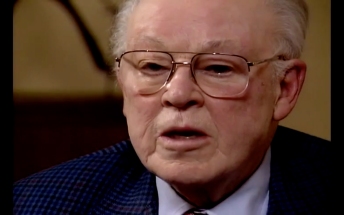By Joe Vitale

At 102, Everett C. Parker passed away. Courtesy of Youtube
The Rev. Everett C. Parker, an advocate for civil rights in the media who used the communication office of the United Church of Christ as a platform for spearheading reforms in broadcasting in the 1960s and 1970s, died on Thursday in White Plains, New York. He was 102.
A member of Fordham University’s Communications Department well into his 90s, Parker’s voice was powerful in effecting formidable changes in broadcast media standards throughout the country.
Parker, while serving as a minister and director of communications for UCC, began to survey radio and television stations in the southern United States in the 1960s, the same time the Civil Rights Movement was gaining momentum. He targeted a television station, WLBT-TV in Jackson, Mississippi, for consistently violating the civil rights of its black viewers by neglecting to cover civil rights news and airing content that referred to black people disparagingly. Parker filed a petition to the Federal Communications Commission (FCC) to deny the station a license renewal for not serving the public interest, as required by law.
The petition was dismissed for a lack of standing, but Parker appealed, protesting that, “the public did have ‘standing,’ and an economic interest, because they owned radios and television sets.”
The appeal was recognized, but WBLT was issued another license, leading to a second appeal. In 1969, Judge Warren Burger, who later served as chief justice of the United States, ruled that the FCC’s record in the case was “beyond repair” and ordered that WLBT’s license be revoked.
“All we’ve ever wanted to do is make it possible for people to express themselves through the system of broadcasting,” Parker told The New York Times in 1983. “If broadcasters are to serve the public interest, they need to be reminded that they serve all the publics.”
Several years later, alongside other religious and civic groups, Parker continued to press television and radio stations on broadcast content and other issues regarding minority representation.
Parker was born in Chicago in 1913, graduated from the University of Chicago in 1935 and worked in radio in Chicago and New Orleans. He then worked for the Works Progress Administration and later opened an advertising agency in Chicago, before attending the Chicago Theological Seminary, where he received a divinity degree in 1943. In 1939, he married the former Geneva Jones, who preceded him in death in 2004.
He is survived by his three children, seven grandchildren and eight great-grandchildren.
When he finished his work at NBC, Parker taught at the Yale Divinity School until 1957. He went on to produce numerous television programs and films, until he led the Office of Communication at the United Church of Christ.
He later became a member of Fordham University’s Communications department, where he lectured well into his 90s.
Faculty were quick to recall their experiences with Parker, whose influence and guidance affected many members of the department.
Faculty members, including Gwyneth Jackaway, recalled Parker’s compassion and ferocity in fighting for progress.
“I was lucky enough to have the chance to chat with Everett each week when he’d come to teach his class,” said Jackaway. “One day I asked if I could take him to lunch. Looking back on this today, I’m amazed that this very busy man made time for such a young colleague.”
Recalling the conversation at Pete’s Diner on Fordham Road, Jackaway added: “The spirit of his response has stayed with me to this day.” Calling him an “incredible inspiration,” she said, “It was an honor to know him and call him a colleague.”
His legacy continues beyond the Fordham community, as he continues to be hailed as a champion for civil rights in the media, and his testimonies before Congress and the FCC continue to serve as a template for equal treatment practices in the media and other related fields.
When asked in 2012 by the website Broadband & Social Justice how he would like to be remembered, Parker remarked: “I want them to remember that I was a guy who fought like the devil for the rights of minorities.”
“Everett Parker was witness to the very evolution of media in the 20th and 21st centuries, an embodiment of how to call out communications industries when they weren’t performing on their highest ethical plane,” added Fordham Professor Paul Levinson, a member of the department. “When I was chair [of the department, from] 2002-2008, there wasn’t a term that went by when students were not knocking on my door, asking if they could get into Ev’s course, already filled.”
“He was in his 90s then,” Levinson said, and he “had more energy than many faculty [members] half his age.”
Robin Andersen, a professor in the Communications department and frequent guest on Parker’s long running public affairs program “View from the Pews,” recalled Parker’s jovial persona on the program, which aired on White Plains Cable TV.
“Everett would sometimes stop the camera to make a point, but more importantly, to correct a detail that we ‘experts’ had missed,” Andersen recalled. “Indeed, I have missed that fun, and will continue to miss him.”
